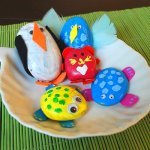Why You Should Teach Your Kid to Share Toys
by Mike
(Australia)
Child psychology is a major aspect of parenting. How you tackle issues your kid faces governs the nature your child will have when he/she grows up.
Why Sharing is Important
Consider a common scenario where you and your best friend are having a picnic. Your kids are playing with their favorite toys and suddenly, your best friend’s child starts crying, because your daughter hit him/her. When you jump in to handle the situation, you ask your child what happened and all your child tells you is “he took MY Barbie!”
This is a common scenario; almost every parent has to go through this. Kids are born with an innate sense of possession. As they grow older, they have to socialize and make friends. That’s what every parent wants – a socially healthy interactive child. This increases confidence in children and they learn to make friendly conversations.
Sharing is an act of giving, and children need to learn to give. If your kid grows without learning to share, there is a greater possibility that he/she will live a friendless life. This goes against the nature of mankind! We are created to be social creatures with emotions and higher intellect. Socializing and making friends also develops children mentally because they get to learn lots of things from their mates.
Besides, kids that don’t learn to share grow into bossy and selfish people. You wouldn’t want to see your child grow into a resentful and isolated person. Therefore, it is better to start teaching your kid to share.
Wondering how to do that?
Here is what you need to do:
1. Teach them to take turns: when your child is in a group of children, make them practice taking turns to play with toys. Start by making your child share toys with you. If he/she has a favorite toy, ask him to let you play with it for 2 minutes. Then return it, and encourage your child for sharing by telling others how wonderful he/she has been to you. Kids love to hear third persons praising them, so make sure your child feels encouraged.
2. Never punish your child for not sharing: In the beginning, your child will resist sharing because they think of their toys as a part of them. Punishing them will only increase hateful sentiments instead of respect for you. If they don’t share simply express your sadness with a sad face, and walk away. When they do share, show positive reinforcement with a hug, kiss or high-five.
3. Offer emotional leverage: Even if your child shares his/her things, the other child may refuse to share with your child. Talk to your child! Make your child feel better. Make him/her understand that the other child is too attached to his/her toy.
To round things up, lead by example!
Mike loves blogging about parenting and children issues. Over the last 4 years, he has written and published numerous articles on child development and education. When he is not working, Mike collects popular toys and action figures.






